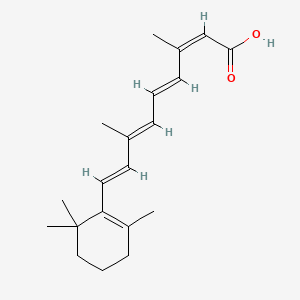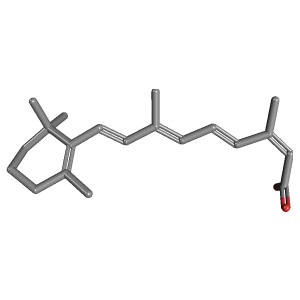Isotretinoin Information
Click here to view all Isotretinoin productsThe information, including but not limited to, text, graphics, images and other material contained on this website are for informational purposes only. No material on this site is intended to be a substitute for the consultation, diagnosis, and/or medical treatment of a qualified physician or healthcare provider.


Isotretinoin is a medication used primarily for the treatment of severe acne. It is a derivative of vitamin A and is also known by its brand names such as Accutane, Claravis, and Roaccutane.
Isotretinoin works by reducing the production of oil (sebum) in the skin, which is a major factor in the development of acne. It also helps in preventing the clogging of hair follicles and reduces inflammation. Additionally, isotretinoin has been found to have an effect on the growth of skin cells, preventing the formation of new acne lesions.
The exact mechanism of action of isotretinoin is not fully understood, but it is believed to work by altering the DNA transcription and gene expression in the sebaceous glands. This leads to a decrease in the size and activity of the sebaceous glands, resulting in reduced oil production.
Isotretinoin is usually taken orally in the form of capsules and is typically prescribed for a course of several months. It is highly effective in treating severe acne, but it can have significant side effects and requires close monitoring by a healthcare professional.
Synonyms of Isotretinoin
- 4759-48-2
- Isotretinoin
- 13-cis-Retinoic acid
- Accutane
- Claravis
- Roaccutane
- Neovitamin A acid
- 13-cis-Vitamin A acid
- Amnesteem
- Isotrex
- Sotret
- 13-cis retinoic acid
- Teriosal
- isotretinoino
- Isotretinoine
- Isotretinoinum
- Absorica
- Roaccutan
- ISOTRETINON
- Roacutan
- Isotane
- 13-RA
- RETINOIC ACID, 13-cis-
- Myorisan
- Zenatane
- Isotretinoine [INN-French]
- Isotretinoinum [INN-Latin]
- Ro-4-3780
- 13 cis retinoic acid
- Isotretinoino [INN-Spanish]
- Isosuprea Lidose
- CIP-Isotretinoin
- cis-RA
- Ro 4-3780
- Accutane (TN)
- Isotretinoin (USP)
- accure
- isotretinoina
- Ro-43780
- (7E,9E,11E,13Z)-retinoic acid
- CCRIS 4286
- HSDB 3929
- Vitamin a acid, 13-cis
- UNII-EH28UP18IF
- EINECS 225-296-0
- EH28UP18IF
- NSC-758156
- Sotret (TN)
- BRN 1885770
- CHEBI:6067
- Isotretinoin [USAN:INN:BAN]
- DTXSID4023177
- ABSORICA LD
- 2-cis-vitamin A acid
- PAT-001
- 13 Cis-Retinoic Acid
- (13cis)-retinoic acid
- 13-cis RA
- 3,7-Dimethyl-9-(2,6,6-trimethyl-1-cyclohexen-1-yl)2-cis-4-trans-6-trans-8-trans-nonatetraenoic acid
- CHEMBL547
- Retinoic acid 13-cis-form
- (2Z,4E,6E,8E)-3,7-dimethyl-9-(2,6,6-trimethylcyclohex-1-en-1-yl)nona-2,4,6,8-tetraenoic acid
- BML2-E07
- DTXCID403177
- Isotretinoin [USAN:BAN:INN]
- 13-cis-retinoic acid,Isotretinoin
- 4-09-00-02388 (Beilstein Handbook Reference)
- Isotretinoin [USAN:USP:INN:BAN]
- (2Z,4E,6E,8E)-3,7-dimethyl-9-(2,6,6-trimethylcyclohexen-1-yl)nona-2,4,6,8-tetraenoic acid
- (2Z,4E6E,8E)-3,7-dimethyl-9-(2,6,6-trimethylcyclohex-1-en-1-yl)nona-2,4,6,8-tetraenoic acid
- NSC 758156
- Isotretinoin Retinoic acid
- R 3255
- ISOTRETINOIN (MART.)
- ISOTRETINOIN [MART.]
- ISOTRETINOIN (USP-RS)
- ISOTRETINOIN [USP-RS]
- cis-Retinoic acid
- Trans-Retinoicacid
- ISOTRETINOIN (EP MONOGRAPH)
- ISOTRETINOIN [EP MONOGRAPH]
- ISOTRETINOIN (USP MONOGRAPH)
- ISOTRETINOIN [USP MONOGRAPH]
- Retinoic acid, cis-
- DRG-0213
- TRETINOIN IMPURITY A (EP IMPURITY)
- TRETINOIN IMPURITY A [EP IMPURITY]
- SR-01000076103
- Cistane
- Isotrexin
- Oratane
- cis-Retinoate
- cis retinoic acid
- Roaccutane (TN)
- Amnesteem (TN)
- Absorica (TN)
- Prestwick_642
- CAS-4759-48-2
- Claravi (TN)
- Decutan (TN)
- Isotane (TN)
- Oratane (TN)
- Clarus (TN)
- Izotek (TN)
- Ro 43780
- Retinoicacid-13-cis
- Isotretinoin Zinc Salt, 13 cis Isomer
- Isotretinoin Zinc Salt, 13-cis-Isomer
- Ro 4 3780
- (13-cis)-Retinoate
- Isotretinoinum (Latin)
- CPD000471891
- 13-cis-RA
- 13cRA
- Prestwick2_000256
- Prestwick3_000256
- Spectrum5_001795
- Spectrum5_001937
- ISOTRETINOIN [MI]
- (13-cis)-Retinoic acid
- ISOTRETINOIN [INN]
- D00DKK
- ISOTRETINOIN [HSDB]
- ISOTRETINOIN [USAN]
- 13-cRA
- Retinoic acid, (13cis)-
- ISOTRETINOIN [VANDF]
- Lopac0_001081
- SCHEMBL38299
- BSPBio_000072
- BSPBio_001331
- BSPBio_003345
- MLS001074662
- ISOTRETINOIN [WHO-DD]
- SPECTRUM1502013
- BPBio1_000080
- GTPL7600
- D10AD04
- D10BA01
- HMS1361C13
- HMS1568D14
- HMS1791C13
- HMS1921D08
- HMS1989C13
- HMS2092N07
- HMS2095D14
- HMS2233A07
- HMS3259J09
- HMS3263I04
- HMS3402C13
- HMS3712D14
- HMS3884A13
- ISOTRETINOIN [ORANGE BOOK]
- Pharmakon1600-01502013
- 97950-17-9
- BCP18950
- Tox21_200093
- Tox21_501081
- BDBM50031459
- LMPR01090021
- MFCD00079542
- NSC329481
- NSC758156
- AKOS015841158
- CCG-205158
- CS-1864
- DB00982
- DS-3367
- LP01081
- NC00635
- SDCCGSBI-0051051.P004
- IDI1_033801
- NCGC00094358-01
- NCGC00094358-02
- NCGC00094358-03
- NCGC00094358-04
- NCGC00094358-05
- NCGC00094358-06
- NCGC00094358-07
- NCGC00094358-08
- NCGC00094358-09
- NCGC00094358-10
- NCGC00094358-11
- NCGC00094358-12
- NCGC00094358-13
- NCGC00094358-14
- NCGC00094358-15
- NCGC00094358-26
- NCGC00257647-01
- NCGC00261766-01
- RETINOIC ACID 13-CIS-FORM [MI]
- BR164589
- HY-15127
- SMR000471891
- 13-cis-Retinoic acid, >=98% (HPLC)
- SBI-0051051.P003
- LS-143465
- EU-0101081
- R0088
- C07058
- D00348
- EN300-1709656
- A917531
- Q287029
- SR-01000076103-2
- SR-01000076103-5
- SR-01000076103-6
- SR-01000076103-9
- BRD-K76723084-001-05-9
- SR-01000076103-10
- Z2311575452
- Isotretinoin, European Pharmacopoeia (EP) Reference Standard
- Isotretinoin, United States Pharmacopeia (USP) Reference Standard
- (2Z,4E)-3,7-Dimethyl-9-(2,6,6-trimethyl-1-cyclohexenyl)-2,4,6,8-nonatetraenoic acid
- Isotretinoin for peak identification, European Pharmacopoeia (EP) Reference Standard
- Isotretinoin, Pharmaceutical Secondary Standard; Certified Reference Material
- (2Z,4E,6E,8E)-3,7-Dimethyl-9-(2,6,6-trimethyl-1-cyclohexen-1-yl)-2,4,6,8-nonatetraenoic Acid
- (2Z,4E,6E,8E)-3,7-dimethyl-9-(2,6,6-trimethyl-1-cyclohexenyl)nona-2,4,6,8-tetraenoic acid
- (2Z,4E,6E,8E)-3,7-dimethyl-9-(2,6,6-trimethylcyclohex-1-en-1-yl)nona-2,4,6,8-tetraenoicacid
- 3,7-DIMETHYL-9-(2,6,6-TRIMETHYL-1-CYCLOHEXEN-1-YL)-2-CIS-4-TRANS-6-TRANS-8-TRANS-NONATETRAENOIC ACID

